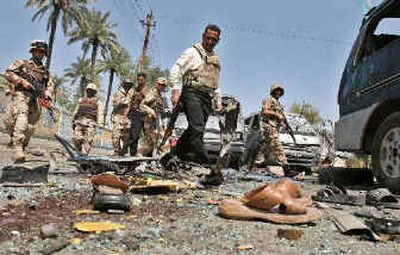Bomb blasts kill dozens in Iraq

BAGHDAD, Iraq – After a car bomb loaded with artillery shells detonated Friday in the Adhamiyah neighborhood in the capital, a woman trapped in a charred, overturned van and cradling an infant in her arms screamed for help. But help was slow in coming. Security forces held back ambulances for more than an hour, fearful of an explosion aimed at soldiers and rescuers.
The grim scene highlighted a deadly tactic of the insurgents – to set off bombs in waves, killing not only people near the first blast but those who try to save them.
Across the country Friday, insurgents unleashed at least 13 mortar, bomb and suicide car bomb attacks against Iraq’s national forces and their U.S. allies, killing at least 41 people, including three American soldiers.
It was the deadliest day in Iraq since early February. Many of the attacks were aimed initially at Iraqi and U.S. police and soldiers on patrol or resting, with secondary bombs killing those who rushed to save them.
“I never expected to see what I saw today,” said Zaid Najjar, who watched from his apartment, trapped with his wounded children, as four rounds of bombs and mortar blasts devastated the central Baghdad neighborhood of Adhamiyah within half an hour. Fires set by the bombs still burned around Najjar as he spoke.
“What hurt me was a National Guardsman who lost his leg and was trying to walk with one leg. He was crying, and screaming out of pain,” Najjar said, also recalling the screaming woman, the corpses of civilians and Guard members, and the despair of survivors.
Laith Kubba, a spokesman for the new prime minister, Ibrahim al-Jaafari, said, “This will just increase our determination to move forward and leave these people behind.” He added, “This is a message from insurgents to the nation, trying to distract them from the biggest achievement Iraq has had in 50 years: an elected government.”
The attackers were “trying to push them back to the days where sheer despair and terror were the norm in Iraq,” he said.
Al-Jaafari, still awaiting his formal swearing-in, spoke briefly to Arabic-language television to send condolences to families of the dead and ask Iraqis to stand behind their new army and police.
Iraqi leaders said former members of Saddam Hussein’s government were working alongside Jordanian-born insurgent leader Abu Musab Zarqawi and other foreign fighters.
An audio message allegedly made by Zarqawi and released Friday on an Islamic Web site promised more attacks. “You, Bush, we will not rest until we avenge our dignity,” the man on the recording said. “We will not rest while your army is here as long as there is a pulse in our veins.”
The day’s violence included four rapid-fire attacks in Najjar’s neighborhood, targeting police and Iraqi National Guard patrols and a restaurant where security forces were gathered for breakfast. The explosions came minutes apart.
At least three other roadside and suicide car bombs hit Baghdad, including one targeting a U.S.-Iraqi patrol. Assailants in that attack waited until well-armored U.S. military vehicles rolled past, then remotely detonated a bomb as members of the National Guard passed, witnesses said.
In Madain, about 18 miles southeast of the capital, attackers struck first with a bomb at the gates of the city, then with a suicide driver targeting a police patrol and with gunmen who attacked security forces in the town.
As Madain’s police and soldiers took their wounded for care, another attacker blew up a car full of explosives, killing himself and two more security force members, police said.
Iraq recently deployed large numbers of police officers and soldiers to Madain, asserting control after reports, still not verified, of Sunni attacks against Shiite families.
Other bombs and suicide attacks Friday claimed lives in Basra, in the south; in Baqubah, northeast of Baghdad; near Taji, north of Baghdad; and in Diyarah, south of the capital. Three U.S. troops died in the latter two attacks.
In a statement, the U.S.-led military coalition here called the attacks “another desperate attempt by the terrorists to discredit the newly formed Iraqi government.” It said attacks overall had gone down since the Jan. 30 elections.
Attacks in Iraq have grown increasingly sophisticated, with insurgents hitting with a first round of mortars, bombs or car bombs, then a second or third after rescuers gather to help the wounded. The violence has been targeted at the Iraqi police and national forces.
On guard against such attacks, Iraqi forces turned back would-be rescuers from devastated Baghdad neighborhoods Friday. Some security forces halted crowds politely, explaining the danger. Others fired directly on civilians who came rushing up.
In one neighborhood, soldiers nearly came to blows with police demanding to be allowed past barricades to bomb sites.
The majority of deaths reported were among security forces. The number of civilian casualties was unclear. At one hospital in hard-hit Adhamiyah, pickups newly loaded with six coffins belonging to slain civilians sat parked outside, surrounded by mourning families.